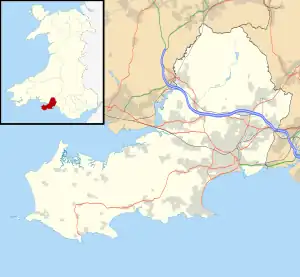Craig-Cefn-Parc television relay station
The Craig-Cefn-Parc television relay station is sited on Mynydd Gelliwastad to the west of Clydach in the Swansea Valley. It was originally built in the 1980s as a fill-in relay for UHF analogue colour television. It consists of a 17 m self-supporting lattice mast standing on land which is itself about 160 m above sea level (and about 90 m above the village of Craig Cefn Parc which it serves). The transmissions are beamed to the northwest to avoid cross-channel interference with the Alltwen transmitter which is about 4 km to the northeast and which uses the same frequencies. The Craig-Cefn-Parc transmitter is owned and operated by Arqiva.
 Craig-Cefn-Parc Kilvey Hill | |
| Mast height | 17 metres (56 ft) |
|---|---|
| Coordinates | 51°42′04″N 3°54′31″W |
| Grid reference | SN6811502046 |
| Built | 1980s |
| Relay of | Kilvey Hill |
| BBC region | BBC Wales |
| ITV region | ITV Cymru Wales |
Craig-Cefn-Parc transmitter re-radiates the signal received off-air from Kilvey Hill about 10 km to the south. When it came, the digital switchover process for Craig-Cefn-Parc duplicated the timing at the parent station, with the first stage taking place on Wednesday 12 August 2009 and the second stage was completed on Wednesday 9 September 2009, with the Kilvey Hill transmitter-group becoming the first in Wales to complete digital switchover. After the switchover process, analogue channels had ceased broadcasting permanently and the Freeview digital TV services were radiated at an ERP of 2W each.[1]
Channels listed by frequency
1980s - 12 August 2009
Craig-Cefn-Parc (being in Wales) transmitted the S4C variant of Channel 4.
| Frequency | UHF | kW | Service |
|---|---|---|---|
| 623.25 MHz | 40 | 0.006 | BBC Two Wales |
| 647.25 MHz | 43 | 0.006 | ITV1 Wales |
| 671.25 MHz | 46 | 0.006 | BBC One Wales |
| 703.25 MHz | 50 | 0.006 | S4C |
12 August 2009 - 9 September 2009
The UK's Digital Switchover commenced at Kilvey Hill (and therefore at Craig-Cefn-Parc and all its other relays) on 12 August 2009. Analogue BBC Two Wales on channel 40 was first to close, and ITV Wales was moved from channel 43 to channel 40 for its last month of service. Channel 43 was replaced by the new digital BBC A mux which started up in 64-QAM and at full power (i.e. 2 W).
| Frequency | UHF | kW | Service | System |
|---|---|---|---|---|
| 623.25 MHz | 40 | 0.006 | ITV1 Wales | PAL System I |
| 650.000 MHz | 43 | 0.002 | BBC A | DVB-T |
| 671.25 MHz | 46 | 0.006 | BBC One Wales | PAL System I |
| 703.25 MHz | 50 | 0.006 | S4C | PAL System I |
9 September 2009 - present
The remaining analogue TV services were closed down and the digital multiplexes took over on the original analogue channels' frequencies.
| Frequency | UHF | kW | Operator |
|---|---|---|---|
| 650.000 MHz | 43 | 0.002 | BBC A |
| 674.000 MHz | 46 | 0.002 | Digital 3&4 |
| 706.000 MHz | 50 | 0.002 | BBC B |
13 March 2013
As a side-effect of frequency-changes elsewhere in the region to do with clearance of the 800 MHz band for 4G mobile phone use,[2] Craig Cefn Parc's "BBC B" multiplex will have to be moved from channel 50 to channel 40.[3]
| Frequency | UHF | kW | Operator |
|---|---|---|---|
| 626.000 MHz | 40 | 0.002 | BBC B |
| 650.000 MHz | 43 | 0.002 | BBC A |
| 674.000 MHz | 46 | 0.002 | Digital 3&4 |
References
- "Freeview on Craig-Cefn-Parc TV transmitter". ukfree.tv. Retrieved 2012-02-17.
- "EU States Must Allow 4G on Analogue TV Spectrum". 15 February 2012.
- "Digital UK confirms further Freeview 4G clearance retune dates for South Wales | a516digital". Archived from the original on 2016-03-04.